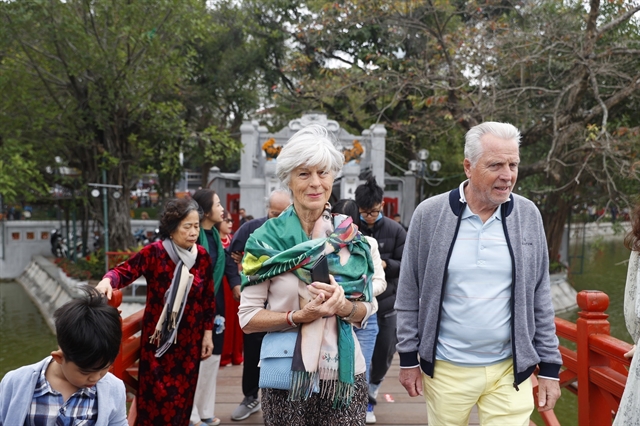
Foreign tourists visiting Ngọc Sơn Temple at Hoàn Kiếm Lake, Hà Nội in February 2024. — VNA/VNS Photo Minh Quyết
HÀ NỘI — Prime Minister Phạm Minh Chính has asked relevant agencies to explore the possibility of issuance of visas on arrival and introducing visas for longer-term stay with multiple entries for foreign tourists in a bid to boost tourism.
The Government leader made the order in Directive 08/CT-TTg for comprehensive, fast and sustainable development of tourism in the coming time.
In the directive, the Ministry of Public Security is told to promote administrative procedure reform, apply scientific and technological advances, and implement automation solutions in handling procedures for foreign nationals entering, residing and travelling safely in Việt Nam. They are responsible for researching and proposing procedures for online exit and entry through facial recognition (FaceID) and electronic passports (e-Passports) to facilitate and expedite tourist travel.
The ministry must also study the issuance of visas on arrival at border gates, and the report must be submitted to the Prime Minister in the second quarter of 2024.
The public security ministry will coordinate with the Ministry of Culture, Sports and Tourism, the Ministry of Foreign Affairs, and relevant agencies to research and propose preferential policies such as conditional exit and entry for some traditional, potential and highly developed markets with large tourism expenditure and long stays in key tourist areas of Việt Nam and regions with synchronised and convenient transportation infrastructure.
Other policies to study include expanding the list of countries that Việt Nam offers visa exemption. Currently, citizens of 13 countries – Japan, South Korea, Russia, Denmark, United Kingdom, Norway, Finland, Sweden, France, Belarus, Italy, Germany and Spain – can enter Việt Nam without visas for stays up to 45 days.
The public security authorities will also need to look at visa exemptions for short periods (from 6 to 12 months) for tourists from some large-scale, high-spending markets, as well as the pilot issuance of long-term visas (12-36 months) with multiple entries to attract high-end tourist market segments, retirees with high spending potential from target markets such as Europe, Northeast Asia, North America, India and some Middle Eastern countries.
Proper approach to boost competitiveness
Hoàng Nhân Chính, Head of the Secretariat, Tourism Advisory Board (TAB), said that in 2023, Việt Nam's tourism made an impressive recovery, reaching 70 per cent of the pre-pandemic figure (12.6 million foreign visitors vs 19 million). The innovation in visa policies is a proper approach, also a common trend among regional countries to attract tourists after the COVID-19 pandemic.
Continuing to expand visa waiver policies will help diversify the tourism market, increase the number of international tourists to Việt Nam, extend their length of stay, and enhance their spending. Consequently, this will boost revenue for tourist destinations, and create more direct and indirect employment opportunities in the tourism sector. Additionally, this policy will increase air travel, facilitate international trade exchanges, and attract more foreign investors to Việt Nam.
Chính shared that in July 2023, the Tourism Advisory Board submitted a letter and research documents to the Ministry of Foreign Affairs proposing to consider expanding the list of countries exempt from visas. This proposal aligns with the Immigration Law, aiming to promote the development of the domestic tourism industry.
The board has studied criteria to expand the list of countries enjoying Việt Nam visa exemption, including: having a significant number of international tourists to Việt Nam with strong growth potential, tourists capable of or having potential for high spending in Việt Nam, being recognised by many countries worldwide and countries in the region for visa exemptions, not posing a threat to the security and social order of Việt Nam, having good diplomatic relations with Việt Nam, having well-developed trade transactions and significant Foreign Direct Investment (FDI) into Việt Nam, and contributing to market diversification.
Accordingly, the expanded list of unilaterally visa-exempt countries feature 33 more countries, including 20 remaining countries in the European Union (Austria, Belgium, Bulgaria, Croatia, Cyprus, Czech Republic, Estonia, Greece, Hungary, Ireland, Latvia, Lithuania, Luxembourg, Malta, Netherlands, Poland, Portugal, Romania, Slovakia and Slovenia), alongside the United States, Australia, New Zealand, Canada, Switzerland, Israel, South Africa, Turkey, Brazil, Argentina, Saudi Arabia, Kuwait and the United Arab Emirates.
Moreover, the Board proposed that the Government consider four potential tourism markets for strong development: China, Taiwan (China), Hong Kong (China) and India.
Tourism businesses all desire long-term stays and multiple entries for guests. Initially, it's necessary to prioritise guests from distant markets for long-term stays. The Tourism Advisory Board suggests that the Ministry of Public Security coordinate with the Ministry of Foreign Affairs, the Ministry of Culture, Sports and Tourism to determine the list and duration of stay for visa-exempt markets to ensure security, national defence, economic and tourism development, and meet the needs of tourists.
Tourism is a competitive business, and Chính remarked that Việt Nam's major competitors in the region are Thailand, Malaysia and Singapore, who are striving to attract tourists from key markets and have made it easy for international tourists to enter their countries. Thailand exempts visas for 76 countries; Malaysia exempts visas for 156 countries, and Singapore exempts visas for 162 countries.
These countries are also highly ranked by the World Economic Forum in its latest report "Travel and Tourism Competitiveness Index 2021" and have high international openness (which measures a country's openness to tourists). Accordingly, Thailand ranks 36th, Malaysia 38th, and Singapore 9th, while Vietnam ranks 52nd.
A better visa waiver policy will help expand opportunities to welcome tourists, according to the expert. This is a short-term solution to open doors to attract international markets alongside medium and long-term solutions for intrinsic issues of the tourism industry such as promotion, digital marketing, product diversification, destination management and human resource development. — VNS
OVietnam